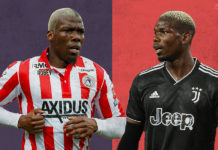
The fellow journalists I pitied most at the 2010 World Cup in South Africa were the FIFA beat reporters. Charged with covering the governing body of the world’s most popular sport, they would dutifully troop off to news conferences armed with a fistful of smart questions and come back to the office with a basket of parsed non-answers, then try to make something of it.
It was a tough gig. While any credible journalist from Durban to Cape Town that summer would have told you FIFA was insular and very likely corrupt, the people in power were a slippery bunch. Too big, perhaps, for any single team of reporters. FIFA controlled huge revenues, and it operated beyond boundaries.
It could tell governments to back off, as it did twice just that year, in the cases of France and Nigeria. Not to mention that journalists who wanted to cover the story billions of people cared about most – what happened on the field – were to some extent dependent on FIFA’s beneficence in terms of media credentials and access.
For anyone who has been trying to crack FIFA, then, the indictment of 14 soccer officials and marketing executives – in an investigation led by US prosecutors and laid out in a document about 160 pages long – has got to be considered a welcome moment. That’s true even if FIFA President Sepp Blatter manages to hold on to power – he faces reelection Friday and has vowed not to step down – and even if the verdicts ultimately are a mixed bag.
The reason? Because corruption at the highest levels of sport sets a tone for all of sport. And it doesn’t get any higher than FIFA’s top brass.
Integrity of the game
It may well be that Blatter will hold on to his position, by the way. Never mind what a Blatter reelection would do to confidence in worldwide soccer or, as NFL executives like to call it, the integrity of the game.
FIFA’s electoral system – one country, one vote – means all the outrage in Europe and the US won’t matter at all in practical terms if a bloc of countries from another part of the world – Africa, say, or Asia – vote as a group for him. His only opponent who overtly advocated a reform agenda, according to anti-corruption group Transparency International, dropped out last week. That was retired Portuguese star Luis Figo, who called the 79-year-old Blatter a dictator as he did so.
Now the anybody-but-Blatter faction has a single candidate, Jordanian prince Ali Bin Al Hussein, an underdog even with the support of European soccer countries.
Mixed success prosecuting sports
Whatever happens in the election, it’s no lock that the work done by American and Swiss investigators ends with a chain of convictions leading to the big boss, as is the aim of a classic mafia case. Federal attorneys have been notably unsuccessful in some of the highest profile sports cases in recent years.
In baseball, Cy Young-winning pitcher Roger Clemens was acquitted in 2012 of charges that he lied to Congress about drug use, and home run king Barry Bonds had his obstruction of justice conviction in another drug case overturned in April.
Federal prosecutors investigated Lance Armstrong about the role of doping in his seven Tour de France victories but dropped the case before even bringing it to trial. And just on its face, there are obstacles to the FIFA case – foreign, wealthy defendants for a start, whom Blatter has quickly distanced himself from.
Why it’s still worth it
Yet chasing the FIFA case is worth it. A culture of corruption doesn’t do the public any good.
Transparency International, which fights for clean governance around the globe, is in the midst of a yearlong initiative aimed at making sports more aboveboard (in the interest of full disclosure, I wrote a piece unrelated to FIFA for the project which will be published in June). It’s notable that the subject of sports was chosen – of all the evils in the world, why choose to focus on sports? – but Transparency frames the issue well on its home page for the project.
“Sport is a multi-billion dollar business engaging billions of people. It is also a global symbol of fair play and a source of great joy for many people on this planet, whether participating, attending or watching events,” the group’s introductory statement says. “With so much public involvement, political influence and money at stake, corruption remains a constant and real risk. Mounting scandals around match-fixing, major events and elections, and systemic deficiencies in sports governance are now so undermining public trust that it is reaching a tipping point.”
In other words, if you don’t think corruption at the top really matters, think again. Already, a convicted match fixer has said FIFA doesn’t do enough to stop a practice that cuts to the very heart of the game. Does anybody at this point really expect FIFA to clean up a dirty sport if its executives are profiting to the tune of millions of dollars?
Failure may lead to success
So, yes, simply what Attorney General Loretta E Lynch and other prosecutors have done already is a step forward. Knocking at the door of the heretofore impenetrable FIFA may well be fruitful in its own right. But sometimes even failure leads to success.
When the US attorney’s office in Los Angeles dropped the Armstrong case, for example, the US Anti-Doping Agency, led by its CEO, Travis Tygart, picked it up. Within a year, Armstrong was banned from cycling and an incredibly detailed cheating scheme was exposed – one that led all the way up to cycling’s international governing body.
A recent report suggests Armstrong could not have gotten away with it if the officials at the top of the sport hadn’t protected him. So even if the FBI’s investigation itself ends right here, it could be the spark that eventually exposes FIFA’s endemic corruption by inspiring others to crack the organization’s deep foundations.




